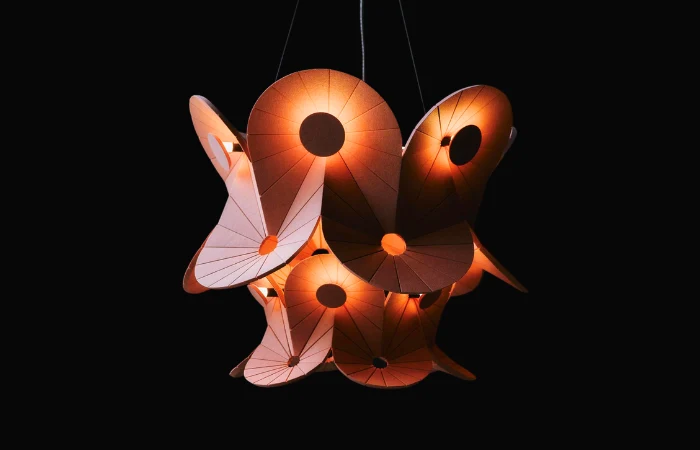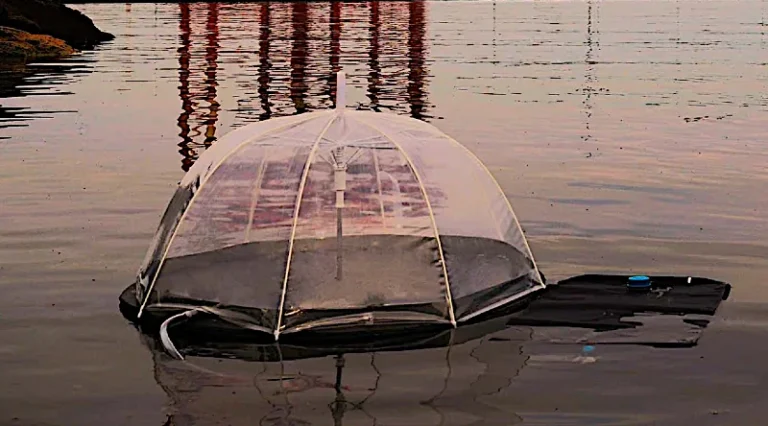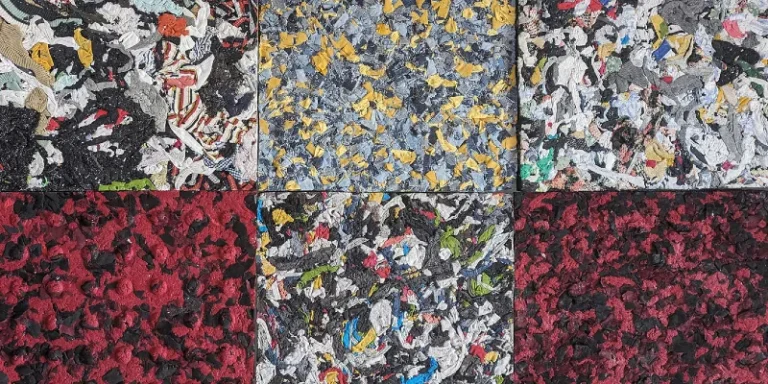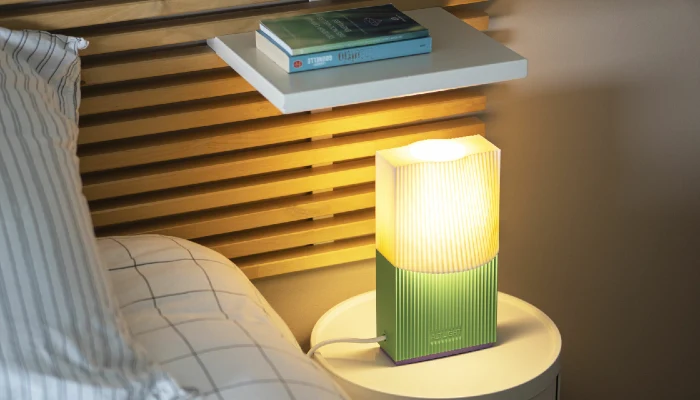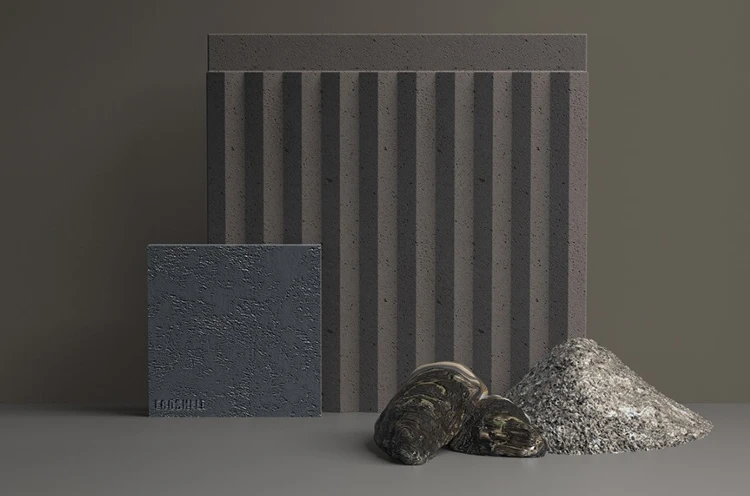Imagine stepping into a room where the light doesn’t just illuminate but dances in harmony with the sound, creating an ambiance that’s both visually stunning and acoustically serene. This is the world of Oloïd, a remarkable invention in the realm of sustainable design, blending the art of light with the science of sound in an environmentally responsible way.
Oloïd is more than just a light fixture; it’s a sustainable acoustic luminaire, a product of the brilliant minds at Impact Acoustic and the renowned design studio atelier oï. This isn’t your average lighting solution – it’s a masterpiece that absorbs sound while illuminating spaces, transforming them into areas of tranquility and aesthetic pleasure.
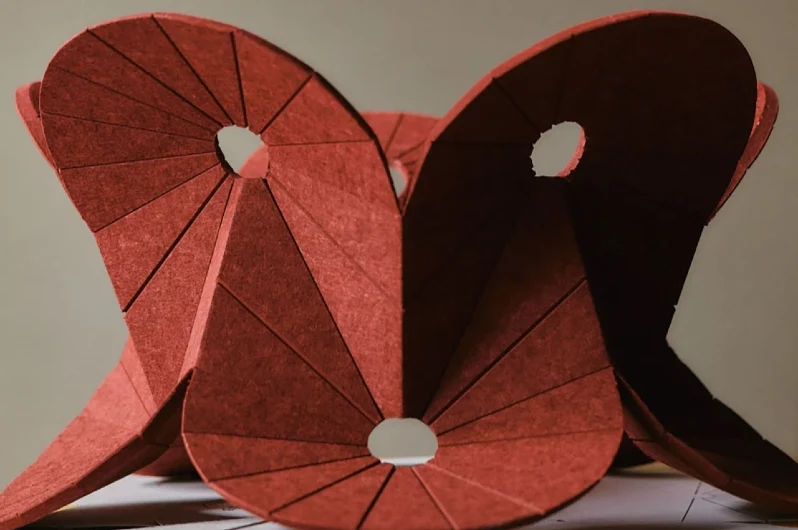
The Heart of Oloïd: Archisonic Felt
At the core of Oloïd’s design is the revolutionary Archisonic Felt, a material crafted from upcycled PET bottles. It’s not just about recycling; it’s about transforming waste into something beautiful and functional. Archisonic Felt is a testament to innovative sustainable practices, boasting impressive sound absorption qualities. It’s not just eco-friendly; it’s a symbol of our commitment to the planet, as evidenced by its Cradle to Cradle certification and LEED accreditation.
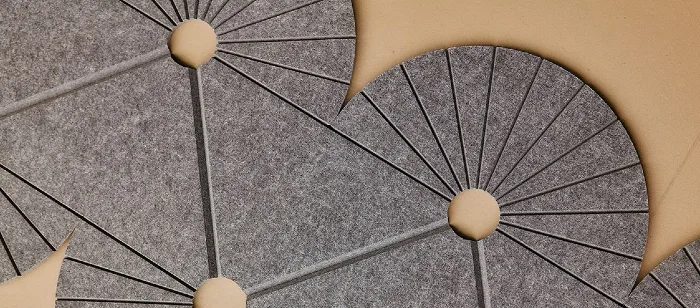
Oloïd isn’t just a product; it’s a concept brought to life through the imaginative process at Atelier oï. Aurel Aebi from Atelier oï shares, “Our goal was to find a way to make the sustainable material speak in a new way.” This was achieved by manipulating the material’s inherent properties to create shapes that defy traditional luminaire designs, adding an organic touch to any space.
A Palette of 32 Possibilities
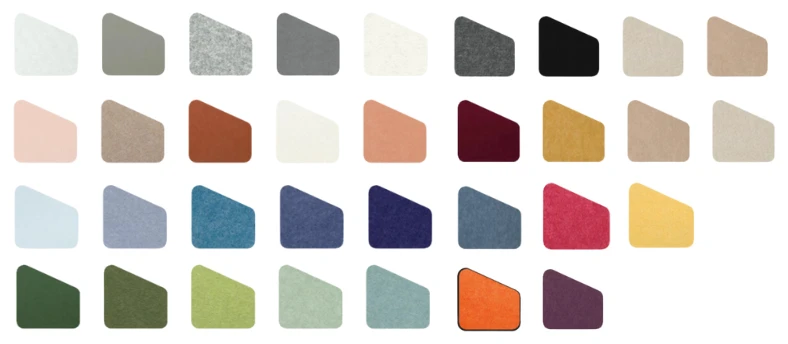
With a stunning array of 32 colors, Oloïd offers unparalleled customization. This feature allows users to tailor their environments to their liking, blending in or standing out as they wish. The design takes advantage of Archisonic Felt’s versatility, transforming flat panels into three-dimensional forms that captivate and inspire.
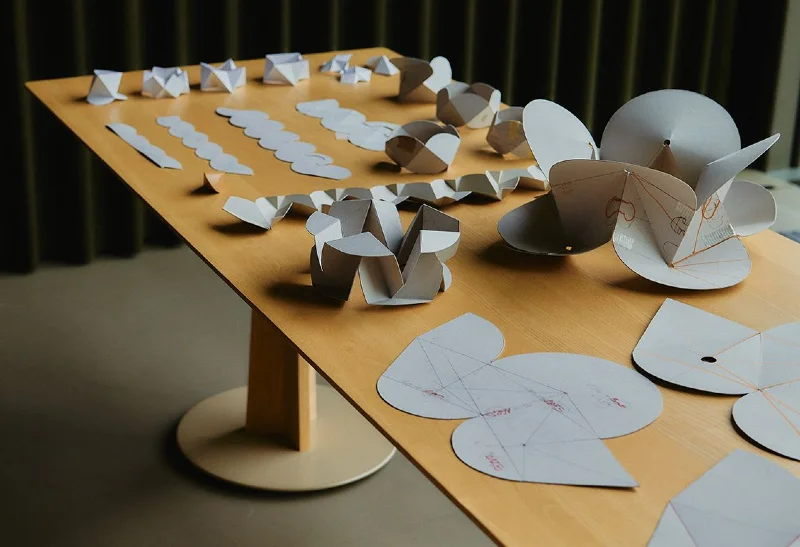
Sven Erni of Impact Acoustic remarks on the transformative journey of their material in Oloïd: “This was made possible using a distinctive cutting technique at specific angles and the skillful folding of the panels.” It’s a process that takes a flat, two-dimensional panel and morphs it into a dynamic, three-dimensional form, showcasing the incredible potential of sustainable materials when combined with creative design.
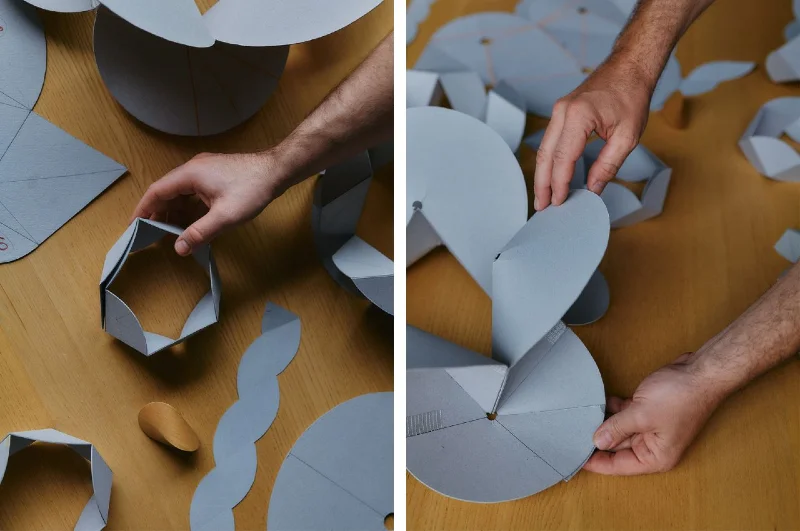
Oloïd: A Beacon of Sustainable Innovation
Oloïd isn’t just a lighting solution; it’s a statement. It challenges us to rethink how we interact with our environments, urging us to consider sustainability not just as an option but as a necessity. By integrating eco-friendly materials, innovative design, and a harmonious blend of light and sound, Oloïd stands as a shining example of what the future of sustainable design can look like.
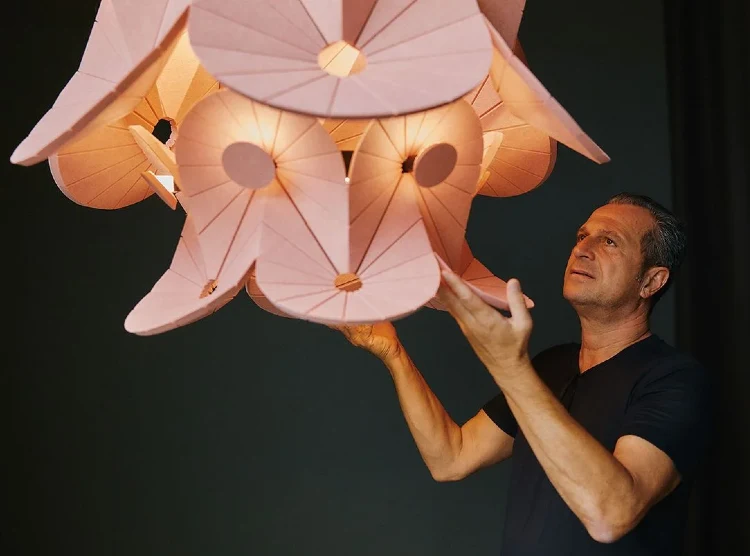
Sustainability Beyond Lighting: How Oloïd’s Product Design Brings Sustainability into Your Home
In a world increasingly conscious of environmental impact, Oloïd stands out not just for its aesthetics but for its sustainable ethos. Here’s how Oloïd redefines sustainability:
- Material Innovation: The use of upcycled PET bottles in creating Archisonic Felt demonstrates a closed-loop approach, turning potential waste into valuable resources.
- Energy Efficiency: While the article doesn’t specify, typically, sustainable luminaires like Oloïd incorporate energy-efficient lighting technologies, such as LED, which consume less power and have a longer lifespan compared to traditional bulbs.
- Sound Absorption and Light Quality: The dual functionality of providing both lighting and sound absorption reduces the need for separate products, thereby minimizing material use and energy consumption.
- Cradle to Cradle Certification: This certification implies that every aspect of Oloïd, from material selection to manufacturing processes, is evaluated for environmental and human health impacts, ensuring a product that’s truly sustainable.
- LEED Accreditation: This indicates that Oloïd contributes to building credits under the LEED certification system, which is a globally recognized symbol of sustainability achievement and leadership.
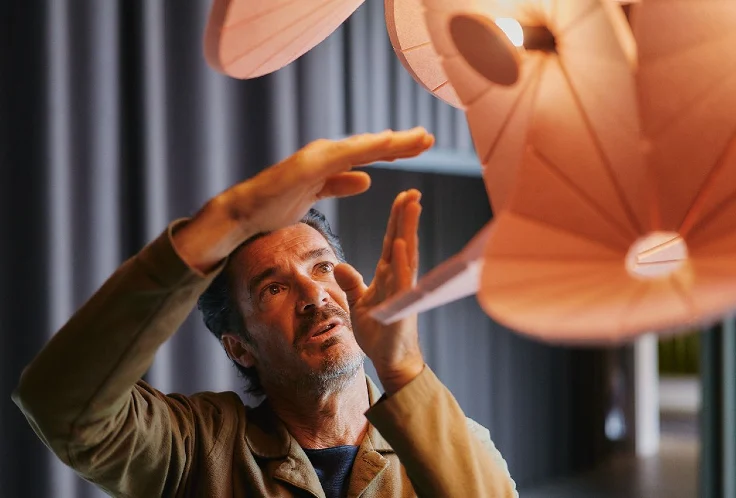
How Using Recycled PET Bottles Makes A Difference & Why You Should Care
Sustainability can’t just be a buzzword, it must become a necessity. Using recycled PET (Polyethylene Terephthalate) bottles in products like Oloïd isn’t just clever green marketing, it’s important and valuable. This practice holds immense environmental benefits, especially considering that the alternative is the traditional use of virgin materials in manufacturing and the pollution, carbon emissions, and oil byproducts, that are included. Of course, if you need more convincing, we have you covered:
Reducing Plastic Waste in Landfills and Oceans
Every year, millions of tons of plastic end up in landfills and oceans worldwide. By recycling PET bottles to create materials like Archisonic Felt, we’re not only reducing the volume of plastic waste, but also preventing it from polluting natural habitats and harming wildlife. For instance, one ton of recycled PET can save approximately 7.4 cubic yards of landfill space.
The production of recycled PET uses significantly less energy compared to manufacturing virgin plastic. This reduced energy consumption translates to lower carbon emissions, contributing to the fight against climate change. Studies show that recycling plastic can cut down greenhouse gas emissions by up to 70%.
Conserving Resources
Recycling PET bottles helps conserve valuable resources, including petroleum, which is a primary ingredient in virgin plastic production. It’s estimated that recycling a single ton of PET bottles saves around 3.8 barrels of oil. This sustainable approach aligns with the global need to reduce our reliance on non-renewable resources.
Encouraging Circular Economy
Using recycled PET fosters a circular economy, where materials are reused and repurposed, extending their lifecycle and reducing the need for new resources. This model not only benefits the environment but also promotes economic growth and innovation in sustainable practices.
Traditional products, often made from virgin materials, carry a heavier environmental burden. The extraction and processing of these raw materials are energy-intensive and contribute significantly to carbon emissions, resource depletion, and environmental degradation.
More To Discover
- Electric Scooter Concept Aims to Overcome EV Challenges with Automated Battery Swap System
- Debris: The Game Turning Marine Plastic Pollution into Sustainable Fun
- CornWall Cladding: Sustainability In The Construction Industry Using Corn Cob Waste
- Smart Hydroponic Sustainable Planter: This Is What Happens When Nature And Tech Meet Green Design
In contrast, products like Oloïd, which utilize recycled PET, demonstrate a sustainable alternative. They not only mitigate the negative impacts associated with traditional manufacturing but also add value to what would otherwise be waste. This approach is a step towards a more sustainable green economy void of greenwashing and where resource efficiency and environmental consciousness are at the forefront of product design and manufacturing.
Meet The Designer: Impact Acoustic
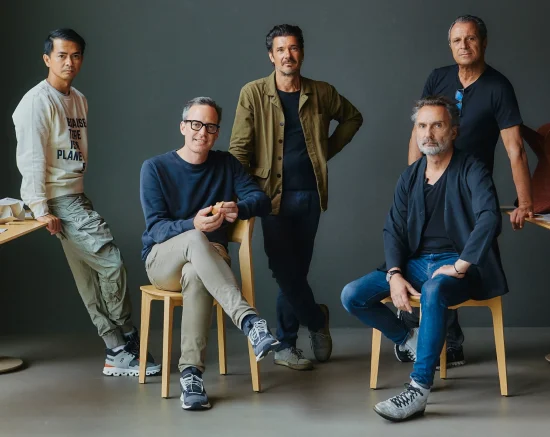
In 2019, Jeffrey Ibañez (left) and Sven Erni (second to left), founded Impact Acoustic in Switzerland. Every day, 100 employees at two locations upcycle thousands of PET bottles into sophisticated and aesthetically pleasing acoustic products: from simple partitions to complex ceiling structures.







